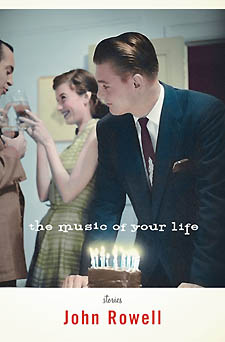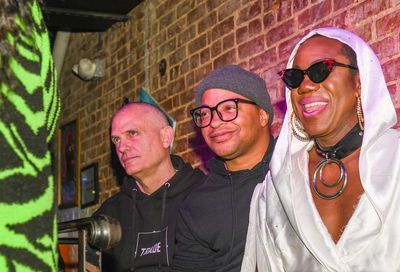Perfect Harmony
The Music of Your Life
 |
John Rowell’s is a moving and hilarious new voice. His new story collection, The Music of Your Life concerns itself with the minutiae of everyday life, but into those small, intimate moments he folds details and memories so universal that every reader will recognize each of these characters — mostly transplanted southerners and gay men — in themselves. This is a book for every reader: metropolitan or rural, northern or southern, rich or poor, gay, straight, or unsure. If you recognize the twisted appeal of the old Batman and Robin TV series, or remember a desire for a swanky lifestyle far different from your own, the characters in Rowell’s stories are your kin.
In the collection’s title story, Rowell takes on a challenging and rewarding device: the second person narrator. It’s a good choice. Through his emotionally resonant writing, you feel unpopular but especially qualified to serve as an ambassador for new kids at your school; you see movie magazines and the new fifth-grade teacher as windows into a more glamorous, less baseball-oriented world; you hope for more understanding from your father; you hurt when the local bullies beat you up. And you do it all to the sounds of big band music from the magical island of Manhattan. “The Music of Your Life ” is a piece of great big, unafraid writing, incorporating the terror of the playground for an unathletic kid, The Lawrence Welk Show, the fantasy of Hollywood, and the shimmering, illicit feel of your mother’s curtains wrapped around you like a ballroom gown. It’s an audacious story, and a welcome introduction to the collection.
The themes Rowell establishes at the start abound throughout this collection. Hollywood glamour and the realities of suburban life, summer stock community theatre and Broadway, physical attractiveness and isolation, child/parent and adult/youth misunderstandings. There is a commonality to the locations as well: New York to the Carolinas, the Carolinas to New York. Each story interweaves an immediate moment, or series of moments, with a deep, nostalgic longing for the perfectly cracked memories and deep isolation of growing up Southern and different in the last thirty years.
“The Mother-of-the-Groom and I ” is a gem. Through the nonchalant telling of a closeted gay son’s visit home for his younger brother’s wedding, and a day trip to help his mother buy her dress, Rowell reconfirms that the smallest moments, simply told, can illuminate whole worlds. In “Saviors, ” the shortest of the stories, the humor is rich and full-bellied. Through the interlocking voices of Burton, Jean Nimocks Sloop, and her niece Bisty (Rowell creates names that ring with ironic southernness) a series of potentially disastrous events unfold into an unexpectedly rewarding denouement. If there is a theme here, it is the ordinariness of yearning — and how important it is to yearn — in a world that bombards us with images of how we are not right and the way the world should be.
|
The final story in the collection, “Wildlife of Coastal California, ” is perhaps the darkest. A missing boy, a gay man emerging from a depression induced two-week exile, and a collection of characters (the “wildlife ” of the title) so stereotypically southern and yet so real combine to create a moving story of fear and hope, and the smallest, most unexpected places to find redemption.
None of these stories should be skipped. While a few of seem stretched thin at the end, each has something — laughter, a tear, a moment of startling recognition — to offer. Still, Rowell does have an occasional problem with endings. There are times when it is almost as if, out of some need to encapsulate and tie down the story, Rowell has forced a (lyrical and metaphoric, but unneeded) epiphany at the end. The stories are strong enough, however, that he would be better served allowing their inherent grace to speak for themselves.
Advertisement
|
Support Metro Weekly’s Journalism
These are challenging times for news organizations. And yet it’s crucial we stay active and provide vital resources and information to both our local readers and the world. So won’t you please take a moment and consider supporting Metro Weekly with a membership? For as little as $5 a month, you can help ensure Metro Weekly magazine and MetroWeekly.com remain free, viable resources as we provide the best, most diverse, culturally-resonant LGBTQ coverage in both the D.C. region and around the world. Memberships come with exclusive perks and discounts, your own personal digital delivery of each week’s magazine (and an archive), access to our Member's Lounge when it launches this fall, and exclusive members-only items like Metro Weekly Membership Mugs and Tote Bags! Check out all our membership levels here and please join us today!


























